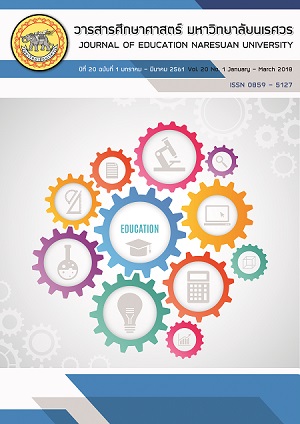การพัฒนารูปแบบการบริหารการมีส่วนร่วมของผู้ปกครองในการส่งเสริมการเรียนรู้ของนักเรียนในสถานศึกษาประถมศึกษาเอกชน; DEVELOPING A MODEL FOR PARENT ENGAGEMENT IN THE ENHANCEMENT OF STUDENT LEARNING IN PRIVATE PRIMARY SCHOOLS
Main Article Content
Abstract
การวิจัย เรื่อง การพัฒนารูปแบบการบริหารการมีส่วนร่วมของผู้ปกครองในการส่งเสริมการเรียนรู้ของนักเรียนในสถานศึกษาประถมศึกษาเอกชนครั้งนี้ การดำเนินการวิจัยมี 3 ขั้นตอน คือ 1) ศึกษาสภาพและแนวทางในการบริหารการมีส่วนร่วมของผู้ปกครอง 2) การสร้างรูปแบบการบริหารการมีส่วนร่วมของผู้ปกครอง 3) ประเมินความเป็นไปได้ในการนำรูปแบบการบริหารการมีส่วนร่วมของผู้ปกครองไปใช้รูปแบบในการส่งเสริมการเรียนรู้ของนักเรียนในสถานศึกษาประถมศึกษาเอกชน ที่พัฒนาโดยกระบวนการวิจัยมี 5 องค์ประกอบหลัก และแนวปฏิบัติเป็นตัวอย่างกับ 3 เงื่อนไขแห่งความสำเร็จ ดังนี้ องค์ประกอบที่ 1 หลักการมีส่วนร่วม ประกอบด้วย 4 หลักการ คือ 1) ความไว้วางใจซึ่งกันและกัน 2) การยอมรับนับถือ 3) การตัดสินใจและรับผิดชอบร่วมกัน 4) ความรักความเมตตา และความซื่อสัตย์ องค์ประกอบที่ 2 วัตถุประสงค์การมีส่วนร่วม ประกอบด้วย 3 ประการ คือ 1) พัฒนาผู้เรียน โดย 1.1) ยกระดับผลสัมฤทธิ์ทางการเรียน 1.2) เตรียมนักเรียนให้มีพื้นฐานทักษะชีวิตและอาชีพ 2) พัฒนาครูเพื่อทำโรงเรียนให้เหมือนบ้าน 3) พัฒนาผู้ปกครองเพื่อทำบ้านให้เหมือนโรงเรียน องค์ประกอบที่ 3 คณะกรรมการมีส่วนร่วมของผู้ปกครอง องค์ประกอบที่ 4 ขอบข่ายการมีส่วนร่วมของผู้ปกครอง 6 ด้าน คือ 1) การช่วยให้ผู้ปกครองปฏิบัติหน้าที่พ่อแม่ที่ดี 2) การสื่อสารกับผู้ปกครอง 3) การให้ผู้ปกครองเป็นอาสาสมัคร 4) การให้ผู้ปกครองช่วยจัดการเรียนรู้ที่บ้าน 5) การให้ผู้ปกครองมีส่วนร่วมตัดสินใจ 6) การร่วมมือร่วมใจกับชุมชน องค์ประกอบที่ 5 กระบวนการบริหารคุณภาพใช้วงจร NA-PDCA คือ 1) การวิเคราะห์ความต้องการจำเป็น 2) การวางแผน 3) การนำแผนไปปฏิบัติ 4) การตรวจสอบและประเมินผล 5) การปรับปรุงแก้ไข และเงื่อนไขแห่งความสำเร็จ 3 ประการ คือ 5.1) โรงเรียนและผู้ปกครองมีความตระหนักว่าตนเองเป็นหุ้นส่วนสำคัญในการการเรียนรู้ของนักเรียน 5.2) ภาวะผู้นำการการบริหารการเปลี่ยนแปลงของผู้บริหาร 5.3) ผู้ปกครองและโรงเรียนรับรู้ในขอบเขตบทบาทหน้าที่ของตนเองอย่างชัดเจน
DEVELOPING A MODEL FOR PARENT ENGAGEMENT IN THE ENHANCEMENT OF STUDENT LEARNING IN PRIVATE PRIMARY SCHOOLS
The main purpose of this research was to develop a model for managing parental engagement to promote the students’ learning in private primary schools. Research procedure followed 3 steps: 1) Studying the state and ways of practice in parent engagement in the enhancement of the students’ learning by using the research techniques: related document and research analysis, learned experts interview, and multi-case study of 3 purposely selected schools with best practices in parental engagement, 2) drafting a tentative model for managing parental engagement to promote the students’ learning through the synthesis of the research findings in step 1 and validating it through group discussion of 9 experts, and 3) evaluating the constructed model for its feasibility by the survey of the opinions of school administrators, teachers, and parents or guardians. Data analysis revealed that the model for managing parental engagement to promote the students’ learning in private primary schools consists of 5 main components: 1) Five principles of parent engagement: trust, recognition and respect, shared decision and responsibility, love, mercy, and honesty. 2) Three objectives of parent engagement: 1) student development; 1.1 raising academic achievement, 1.2 equipping students with basic life and career skills, 2) teachers and school staff development to make a home-like school, and 3) parents’ development to make a school-like home. 3) Executive committee of parent engagement. 4) Scope of parent engagement: six types of parent engagement, namely, parenting, communicating, volunteering, learning at home decision making, collaborating with the community, and 5) management process of PDCA; three conditions for success are attached to the model: 5.1) parents, schools, and community are aware that they are important partnerships in promoting the students’ learning, 5.2) transformational leadership of the school administrator, and 5.3) Parents and schools are clarified with their roles in schooling the students.
Article Details
The owner of the article does not copy or violate any of its copyright. If any copyright infringement occurs or prosecution, in any case, the Editorial Board is not involved in all the rights to the owner of the article to be performed.
References
Brite, J. (2014). The Dual Capacity-Building Framework for Family-School Partnerships. Retrieved April, 2014, from https://blog.ed.gov/2014/04/department-of-education-releases-new-parent-and-community-engagement-framework
French L., Wendll, Bell, Jr. Cecil H., & Zawacki, Robert A. (2005). Organization development and transformation: Managing effective change (6th ed.). New York: McGraw-Hill.
Hoy, Wayne K., & Miskel, Cecil G. (2013). Educational Administration (9th ed). New York: The McGraw Hill.
Joyce L. Epstein, Mavis G. Sanders, Steven Sheldon, & Beth S. Simon. (1997). School, Family and Community Partnerships: Your Handbook for Action. Thousand Oaks, California: Corwin Press.
Office of the Education Council. (1998). Learning: the treasure within, a report to UNESCO by commission of 21st century skills education. Bangkok: Kurusapa Printing Ladphrao. (in Thai)
Runcharoen, T. (2007). Professionalism of educational management and administration during education reform (4th ed.). Bangkok: Khaofang Publishing. (in Thai)
Sanrattana, W. (2013). 21st century just the beginning brighter education, brighter future let's start now. Bangkok: Thipayawisut. (in Thai)
Sinlarat, P., et al. (2007). Education transformation: Heading towards the knowledge-based economy. Bangkok: Faculty of Education, Chulalongkorn University. (in Thai)
Trilling Birnie, & Fadel Charls. (2009). 21st century skills: Learning for life in our times. San Francisco: John Wiley & Son.

